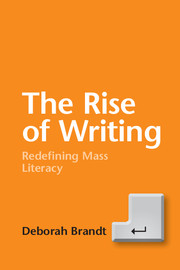1 - The status of writing
Published online by Cambridge University Press: 05 January 2015
Summary
Writing has always been used for work, production, output, earning, profit, publicity, practicality, record-keeping, buying, and selling. Increasingly, writing itself is the product that is bought and sold, as it embodies knowledge, information, invention, service, social relations, news – that is, the products of the new economy. At the turn of the twentieth century, knowledge workers represented 10 percent of all employees. By 1959 this proportion had increased to more than 30 percent of the workforce, and by 1970 it was 50 percent. In 2000, knowledge workers were estimated to account for 75 percent of the employed population, with the biggest gains found among highly educated professional and technical workers in government and service-producing industries (Wyatt and Hecker 2006). If, as Thomas Stewart (1998) asserts, “Knowledge has become the primary ingredient in what we make, do, buy, and sell” (p. 12), then writing has become a dominant form of labor as it transforms knowledge and news into useable, shareable form.
“I write the entire day. My whole job is on paper,” a mortgage broker told me. An historical society librarian said, “I write all day. I may work on as many as 50 texts of one sort or another.” An Internet entrepreneur reflected: “If you think about what I do for a living, I type on my computer. And I’m not writing software. I’m writing words to people. Even when I’m on the phone I’m writing.” “Seventy percent of my job is writing,” estimated a corporate manager. “At least 75 percent writing,” said a legislative aide. “Eighty percent,” reported both a policy analyst and a communications specialist. “Fifty percent of the day,” said a clinical social worker. “Four hours a day,” said a police officer. “Conservatively, a fourth to a third of my time,” estimated an insurance underwriter. “Twenty percent of my time,” said a bookkeeper. “Close to 40 or 50 percent of the time,” said a farm manager. “I spend a lot of time writing,” said a nurse. “A lot when production must be done in a short period of time,” explained a sales coordinator. “It goes in spurts,” said a scientist. “How much time? Too much time,” reflected a social service provider.
- Type
- Chapter
- Information
- The Rise of WritingRedefining Mass Literacy, pp. 16 - 52Publisher: Cambridge University PressPrint publication year: 2014



